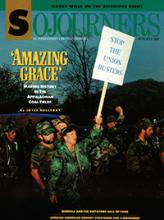The image of a Christian army rising up and remaking American politics has been exaggerated, either in hope or fear, over the last two decades. The movement's rise seemed rapid and unexplained, and its demise has been prematurely announced, whether for celebration or lament. Pat Robertson's campaign last year seemed to incorporate all the false perceptions of this phenomenon, looming with apocalyptic force for about 15 minutes, then fading away as if it had not happened.
Beneath these moments of panic or promise, the aspects of right-wing religiosity picked out by the restless spotlight of publicity, there is a more solid and enduring religious reality that has been negotiating a new relationship with our political system. That reality is not going away, and its time of political influence is still in an early stage.
The real beginning of political activism among the low-church Protestants who make up the core of the Religious Right was in the 1950s, and was the result of court decisions and public demonstrations affecting racial segregation. This threatened deep social attitudes, large patterns of behavior, in which religion was an important factor. It had been necessary to the psychic health of white Southerners, to their, self-esteem and sense of dignity, to believe that their relations with blacks were right and moral -- that is, sanctioned by their own deepest beliefs. The care of blacks in their place was an act of Christian charity in their minds, not a violation of fundamental human values. Jim Crow always had a Bible in his pocket.
Read the Full Article

